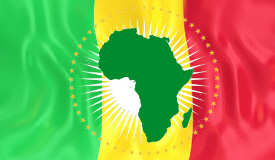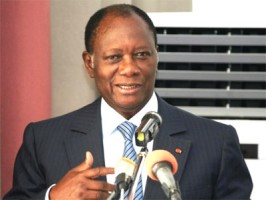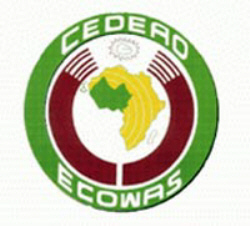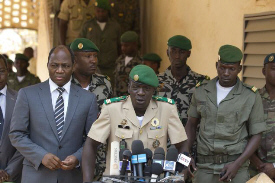Mali’s military junta and the West African bloc ECOWAS announced a deal late Friday that includes the lifting of sanctions and an amnesty for those involved in last month’s coup.
 Mali's military junta and the West African bloc ECOWAS announced a deal late Friday that includes the lifting of sanctions and an amnesty for those involved in last month's coup.
Mali's military junta and the West African bloc ECOWAS announced a deal late Friday that includes the lifting of sanctions and an amnesty for those involved in last month's coup.
It came after Mali's Tuareg rebels declared independence Friday in the north, a move rejected by the international community and the insurgents they fought beside, as fears grew of a humanitarian crisis.
The agreement provides a framework for a return to constitutional rule under an interim leader who will oversee democratic elections and handle the crisis in the north, where extremists and Tuareg rebels have seized control.
 ECOWAS chief Alassane Ouattara of Ivory Coast said sanctions should be lifted "immediately", Burkina Faso's Foreign Minister Djibril Bassole told public television station ORTM, referring to Friday's deal.
ECOWAS chief Alassane Ouattara of Ivory Coast said sanctions should be lifted "immediately", Burkina Faso's Foreign Minister Djibril Bassole told public television station ORTM, referring to Friday's deal.
He also said President Amadou Toumani Toure, who was overthrown on March 22 and has not been seen since in public, should be able to live where he wants under army protection.
On April 2 ECOWAS decided to clamp an immediate total embargo on Mali, a north African country of 15 million inhabitants, in a bid to return to constitutional order after the March 22 military coup.
The embargo included the closing of all borders of ECOWAS states with Mali except for humanitarian reasons, closing to Mali access to ECOWAS ports, and the freezing of Malian bank accounts.
 At the same place coup leader Amadou Haya Sanogo had announced Tuesday that the junta planned legal action against Toure for "high treason and embezzlement."
At the same place coup leader Amadou Haya Sanogo had announced Tuesday that the junta planned legal action against Toure for "high treason and embezzlement."
The text of the deal was signed by Bassole and Sanogo, with Ivorian Minister for African Integration Adama Bictogo and Nigeria's Foreign Minister Nurudeen Muhammad as witnesses.
Under the agreement, to be carried out "under the aegis of the ECOWAS mediator and with the support of the international community," the speaker of the national assembly would become interim president with a transitional prime minister and government.
The single-chamber Malian parliament is headed by Dioncounda Traore, who is currently abroad.
 The accord states that the interim president would have "a mission to organize a presidential election in the constitutional timeframe of 40 days."
The accord states that the interim president would have "a mission to organize a presidential election in the constitutional timeframe of 40 days."
However, given the "exceptional circumstances... due to the institutional crisis and the armed rebellion in the north" it would be impossible to hold elections within 40 days and so it was "indispensable to organize a political transition" until electoral lists could be revised and "accepted by all."
The United States, Africa and Europe dismissed Friday the National Movement for the Liberation of Azawad's (MNLA's) declaration of independence.
A democratic success since its last coup 21 years ago, Mali is now roughly divided into a Tuareg rebel-controlled north and junta-controlled south.